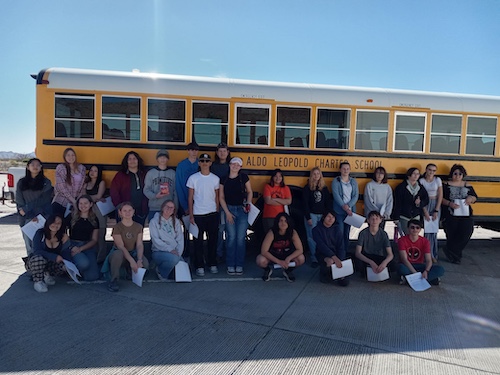 On February 20-23 the 10th grade class at Aldo Leopold Charter School under the direction of history teacher Pete Rankin embarked on the school’s annual trip to the southern border and low desert county. In Rankin’s description of the trip for school families, he writes:
On February 20-23 the 10th grade class at Aldo Leopold Charter School under the direction of history teacher Pete Rankin embarked on the school’s annual trip to the southern border and low desert county. In Rankin’s description of the trip for school families, he writes:
In our life-long quest to understand where we live and where we come from in time & space, we are heading down from the mountains of our beloved Gila, across the Tumacacori Highlands & into the Salt River valley around Phoenix. It’s time to learn about art, biology, culture & humanity’s ‘capacity to endure’ while focusing upon three engaging and historically relevant themes throughout modern world history, (i) international human rights, (ii) human identity & migration, and (iii) how our species deals with conflict. To engage in experiences that guide us in becoming conscious of the biological, social, economic and political realities that form our collective heritage.
Students visited the US Border Patrol station in Nogales, the People Helping People educational office and a Shrine for Migrants on the International Border near Arivaca Lake, area public lands, the Musical Instrument Museum in Phoenix, AZ, and the Oak Flat Indigenous Rights Encampment.
Students had the opportunity to (a) experience international border issues & indigenous rights movements through a humanitarian lens – cast in the light of their World History focus on the topic of natural rights -- and to (b) integrate their ongoing class discussion about the global factors influencing the displacement and movement of people over the course of our globalized human history.
10th grader Ivy Stephens-Etheridge reflects on her learning in her journal entry:
On the first day of the trip, we visited People Helping People (PHP), and we went on a hike where we saw water that had been left out for migrants. The PHP people taught us how the North American Free Trade Agreement (NAFTA) has affected human migration and the two main types of people crossing the border. NAFTA hurt Mexican farmers with smaller farms because the US farmers with giant farms could sell all their excess crops in Mexico cheaply.
The two main types of people crossing the border (or migrants) are seasonal workers and asylum seekers. Seasonal workers don’t want to get caught by Border Patrol. They want to come to the United States, earn money, and go home. The people in the book The Devil’s Highway were seasonal workers. Asylum seekers want to get caught by Border Patrol. They want to come to the United States and live here. Asylum seekers are running away from violence in their home countries.


